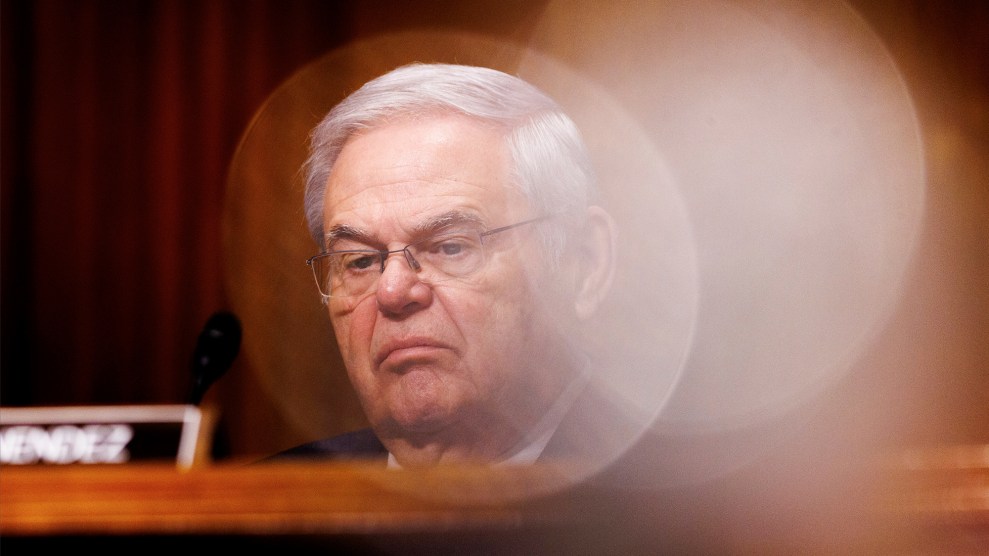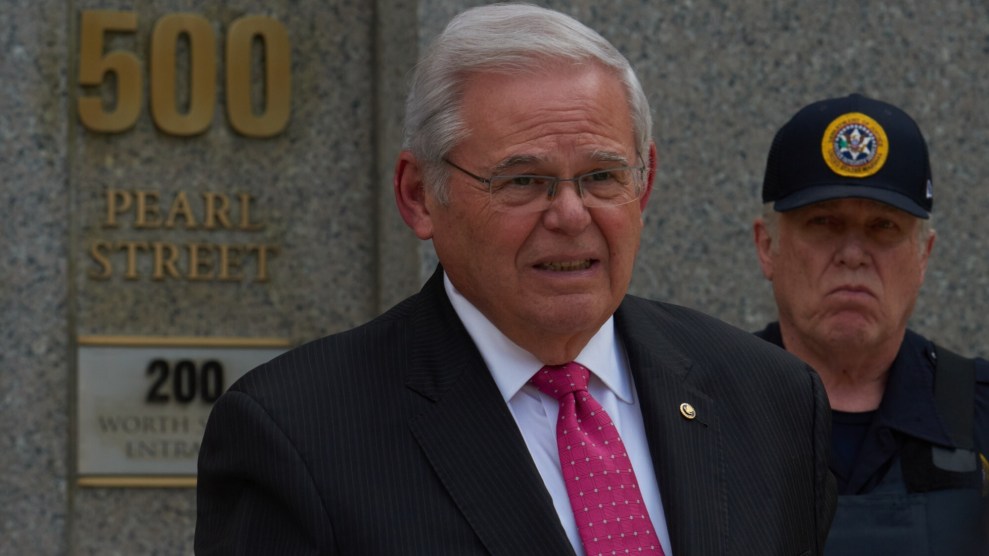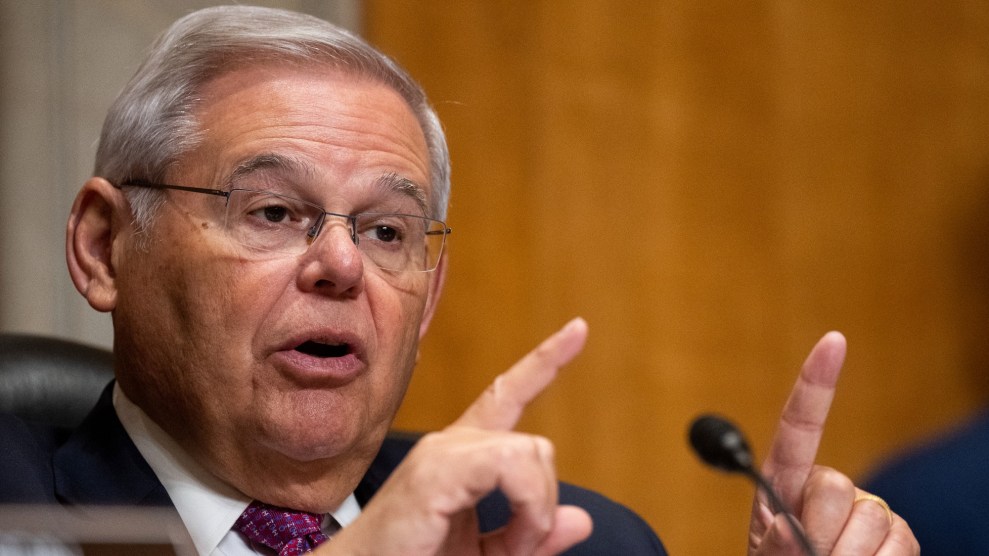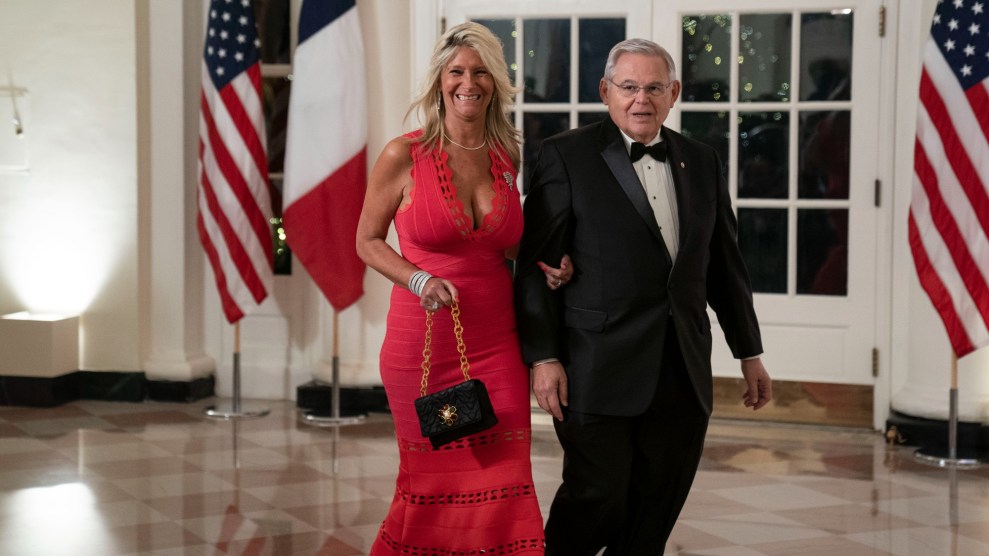
Aaron Schwartz/NurPhoto/AP
A jury found New Jersey Sen. Robert Menendez guilty on all counts on Tuesday afternoon, marking the end of the powerful lawmaker’s two-month corruption trial.
Federal prosecutors had accused Menendez of accepting bribes in exchange for using his clout as the top Democrat on the Senate Foreign Relations Committee to benefit Qatar, Egypt, and several personal associates. In June 2022, the FBI found evidence of the bribery scheme at his New Jersey home—gold bars, a Mercedes-Benz convertible, and home furnishings, as well as more than $480,000 in cash hidden in envelopes, clothing, closets, and a safe. The senator pleaded not guilty and claimed that he wasn’t aware of the money in the bedroom closet because his wife, Nadine, kept the door locked. Nadine was also charged but her trial has been postponed indefinitely as she recovers from breast cancer surgery. One of the couple’s co-defendants, Jose Uribe, pleaded guilty in March and testified against Menendez at trial.
According to Politico and the Bergen Record, in a five-hour closing argument starting last Monday, prosecutor Paul Monteleoni went through each charge in the 18-count indictment, connecting the lawmaker and his wife to gifts from three New Jersey businessmen—the co-defendants in the case—via emails, phone records, texts, and witness testimony. The prosecution team also asserted that Menendez made direct efforts to protect his co-defendants from criminal investigations, including attempting to secure the appointment of a particular candidate to lead the New Jersey US Attorney’s Office in the hope of shutting down a probe.
“Friends do not give friends envelopes stuffed with $10,000 in cash, just out of friendship,” Monteleoni stated last Tuesday. “Friends do not give those same friends kilogram bars of gold worth $60,000 each out of the goodness of their hearts.”
Defense attorney Adam Fee addressed jurors last Tuesday, calling the prosecution’s evidence a “towering Jenga stack of stuff.” He asserted that Menendez kept money in his home because “everyone in his family was basically hoarding cash” due to their experiences of receiving visits from the Cuban police before they fled in 1951.
In her testimony, Menendez’s sister, Caridad Gonzalez, recalled that their father didn’t trust banks, saying, “It’s a Cuban thing. They were afraid of losing what they worked so hard for.”
According to the New York Times, after Menendez’s guilty verdicts were announced, Judge Stein said, “I think everybody was very well tried. From the standpoint of the court, it was a well-tried case all around. Thank you.”
There is now pressure on the senator to resign before his term ends, but there is nothing in the Constitution that requires him to give up his seat. Senate Majority Leader Chuck Schumer (D-N.Y.) called on Menendez to step down, releasing a statement saying, “In light of this guilty verdict, Senator Menendez must now do what is right for his constituents, the Senate, and our country, and resign.” Schumer has so far refrained from attempting to expel Menendez; it’s unclear if he will now do so if Menendez refuses to leave willingly.
Rep. Andy Kim (D-N.J.), the Democratic nominee to take over Menendez’s seat in the Senate, described the verdict as “a sad and somber day for New Jersey and our country.” He went on to write, “I called on Senator Menendez to step down when these charges were first made public, and now that he has been found guilty, I believe the only course of action for him is to resign his seat immediately. The people of New Jersey deserve better.”
“I’m deeply disappointed by the jury’s decision,” Menendez said outside the courthouse, according to the Times. “I have never violated my public oath. I’ve never been anything but a patriot of my country and for my country.” He ignored reporters’ questions about whether he planned to resign.
Menendez technically remains on the November ballot as an independent candidate.
This wasn’t Menendez’s first legal rodeo. Prior to winning reelection to the Senate in 2018, he faced a separate corruption prosecution that ended in a mistrial. The congressman was accused of helping a wealthy Florida ophthalmologist in a Medicare fraud scheme. In return, Menendez allegedly received various gifts from the doctor, including trips on his private jet, admission into a resort in the Dominican Republic, and campaign contributions. That case was made more challenging for prosecutors in part because of a unanimous 2016 Supreme Court ruling that overturned former Virginia Gov. Bob McDonnell’s (R) conviction on fraud, extortion, and conspiracy charges. At the time, Chief Justice John Roberts said the prosecution’s definition of an “official act” under federal bribery laws was overly broad.
Tuesday’s verdict follows another landmark Roberts opinion that could make some public corruption cases more difficult for the Department of Justice to pursue. Earlier this month, the court’s conservative majority ruled that former presidents—in that case, Donald Trump—enjoy absolute immunity from criminal prosecution for at least some official acts they performed in office and that prosecutors cannot introduce broad categories of evidence related to those acts. Menendez’s attorneys had some success at trial making a similar argument: Judge Stein ruled that the Constitution’s Speech or Debate Clause barred prosecutors from using some evidence related to Menendez’s work as a member of Congress.
But those favorable rulings weren’t enough for Menendez to avoid Tuesday’s guilty verdicts. Stein has set the sentencing date for October 29.


















